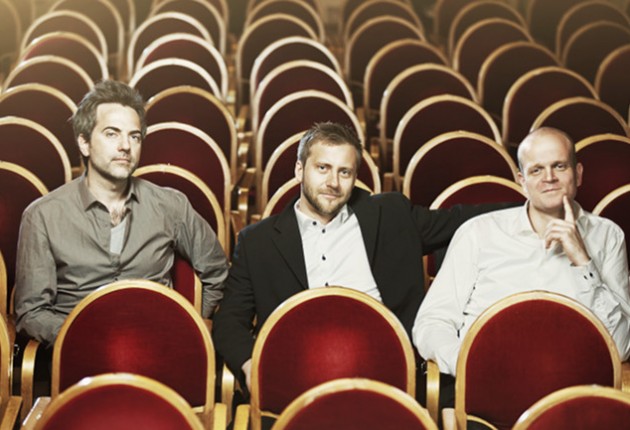
An interview with Espen Eriksen
Espen Eriksen is a Norwegian composer and pianist based in Oslo, a City known for a strong jazz scene, with a jazz festival that has been running for thirty years and presents the best international names as well as homegrown legends like saxophonist Jan Garbarek, and promising young musicians. Eriksen is an accomplished and well-rounded writer, who has released three albums with his acclaimed trio, comprised of himself and bassist Lars Tormod Jenset and drummer Andreas Bye, on the Rune Grammofon label. The trio have performed at Jazz festivals across Europe, and embark on their first trip to South Africa later in the year. Ahead of their show at Band on the Wall on 26th May, we spoke to Eriksen about his approach to composition, his trio bandmates and the musicians who have made guest appearances with the trio.
Your music is notable for being very melodic and direct, and rather than looking to great complexity, you involve elements of Scandinavian folk. What lead to you realising this was what you wanted to write and create?
When I was younger I tried to write those fancy and tricky songs, but it just never felt right. I had to admit to myself that I actually loved melodies. I also think grooving up with pop songs, rather than jazz also has made an impact. I mean, you can only hope to offer something of substance to the world if you are honest and true to yourself. If you try to copy someone else, there’s really nothing there.
I guess you could say that there’s a folkloristic aspect to our music, but not so much in melodic similarities. I think it has more to do with the approach. Folk songs, like for example lullabies, have this quality that they, with only few notes, can produce more musical meaning and emotional impact than many fancy and “fabricated” jazz themes. I like the way history seemingly has eroded all superficial embellishment and left us with the core.
I’m inspired by the less is more approach to writing; not to use more notes than is necessary to tell stories and create the particular moods we want with our music. That said, even though the trio’s songs have melodic surfaces, they’re attraction often are lies in the tension between melodic minimalism and contrasting harmonics, rhythms and arrangement. Songs like Intermezzo, Komeda and Floating have really intricate harmonic changes, but together with the melody it has a natural feel to it. Other songs have other aspects that help create originality. For example in songs like In the mountains and On the sea it’s respectively the changing meters and rhythmic fabric that does the trick.
When you write music is it always from your home in Norway, or have you taken to writing on the road?
Up to this point all the music has been written in Norway. I might get some ideas, but when we’re touring I don’t have the patience to “waste” the opportunity to see new things and meet new people, doing something I might as well do at home.
You occasionally have guest musicians playing alongside the trio, who have been the most exciting players to work with?
Actually, Andy Sheppard, who we are playing two concerts with at Pizza Express Jazz Club in London on this tour, although he is only our second guest musician. We played one concert at a Norwegian festival three years ago with the great Norwegian saxophonist Trygve Seim. Like Andy Sheppard, he’s also an ECM recording artist and shares many of our aesthetic preferences.
There have been quite a few festivals and clubs abroad, for example in Asia, asking us to play with local musicians. We usually decline, as in our tenth year playing together, our interplay is really intertwined and it’s difficult to bring in someone new. There’s also a question of a shared musical language. In the case of Trygve Seim and Andy Sheppard, both are musicians we admire and we know both understand our music and have the ability to add another dimension to it.
Tell us about Lars and Andreas who accompany you in the trio, how did you meet and begin playing together?
I first met and started to play with Lars back in 1998 when we studied music together in Oslo. After some years he moved to Copenhagen to study music further. He had just returned to Oslo in 2007, when I was in the process of assembling a new line up. As I knew he was a good match both musically and personally, I was glad he wanted to join the trio.
At that time I didn’t know Andreas. I of course knew of him. He was kind of in a different league, playing with jazz stars like Bugge Wesseltoft. I had talked to Andreas on several occasions, but when I asked him to join the trio it was by text. I thought it was better than calling, because it would spare both of us the embarrassment if the answer was “no”. But luckily, he said yes!
You’re heading to South Africa in December for a run of shows there, is this your first trip to Africa with the trio, and what are you hoping to discover there?
Yeah, this is our first trip to South Africa and to Africa in general, so we’re very excited. We really don’t know what to expect, but hopefully the audience in South Africa will appreciate our music. To be able to travel the world, see things and meet new people is one of the biggest advantages of playing music, and I also think it’s important to not only focus on us bringing something to another part of the world, but to also come home with new experiences, new music and new insights.
When audiences in different countries, like for example South Korea and Russia, both say that our music connects with their Country’s national character – music that in Western Europe is perceived a typical Nordic and Scandinavian – it’s really a reminder that human experience is not that different whoever you are and wherever you live. That’s the more philosophical answer.
On a more pragmatic level, we of course hope to expand our fan base wherever we are invited to play, hoping that we can come back and play for even more people the next time around. Personally I hate the winter, it gives me constant colds and puts me in a bad mood, so travelling to South Africa in December is like medicine for me. All the people I know who have been to South Africa speak so highly of both the people and the nature there, so I’m really looking forward to it.







